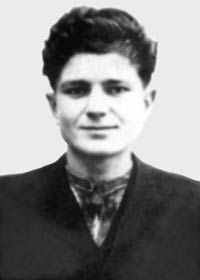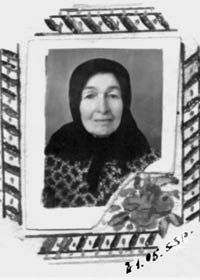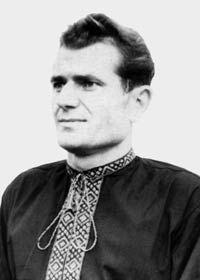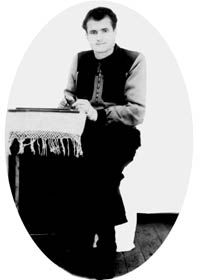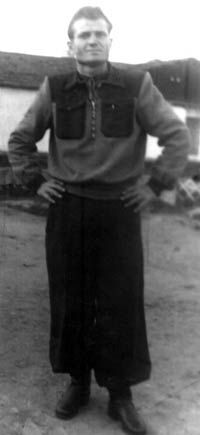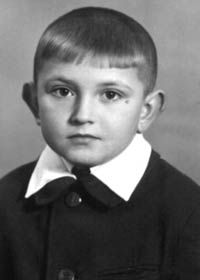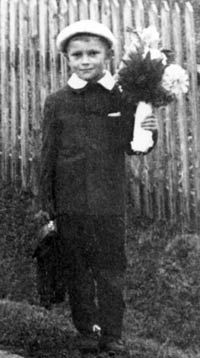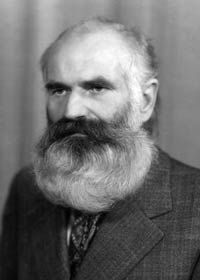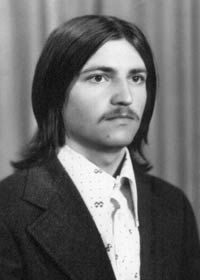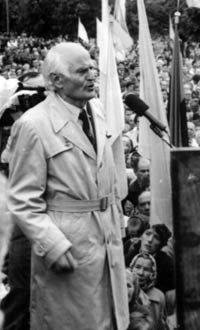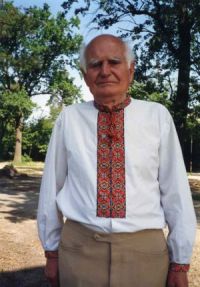(Born on August 18, 1926, in the village of Vytvytsia, Dolyna raion, Ivano-Frankivsk oblast—died on July 5, 2010, in Riga, Latvia).
A participant in the national liberation movement, a member of the Ukrainian Helsinki Group, and Chairman of the UCDP.
From a peasant family. In 1942, Sichko joined the OUN Youth Network, and in 1943, he became a 6th-grade student at the Lviv State Gymnasium. In the spring of 1944, the OUN leadership sent him to the Carpathians to the Second Officer School of the UPA-West “Oleni” in Rozhanky. After graduating in November of that year, he was sent to the Chorniy Lis (Black Forest) to the unit of commander “Rizun,” where he served as a political instructor for a company, and later for a battalion (kurin). In the summer of 1945, using forged documents, he enrolled in the Faculty of Philology at Lviv University but left due to suspicion. The following summer, he enrolled in the Faculty of Philology at Chernivtsi University, where he created the underground student “Organization of Fighters for a Free Ukraine” (OBZVU).
On February 12, 1947, at the age of 21, Sichko was arrested in Chernivtsi and convoyed to the Main Investigative Body of the NKVD for the Carpathian District in Lviv. He endured severe physical and psychological torture but did not betray anyone. He expected the death penalty, but on June 23–26, 1947, the military tribunal of the MVS troops of the Lviv oblast sentenced Sichko to 25 years of imprisonment, 5 years of exile, and 5 years of disenfranchisement under Article 54-1a-11 of the Criminal Code of the Ukrainian SSR.
From July 1947, Sichko served his sentence in the Shodrovo camp (Kemerovo oblast), where prisoners died en masse from starvation and exhausting labor. In the spring of 1949, he was transferred to the Taishet camps (Ozerlag). For participating in acts of defiance and strikes, he was moved from camp to camp, passing through dozens of them.
In the autumn of 1949, he was transported by sea to Kolyma, in the Magadan oblast. In the spring of 1954, while in the hospital, he met fellow political prisoner Stefania Petrash, who had already been released into exile. In early January 1956, Sichko was also released into a settlement without the right to leave, and on St. Stephen’s Day, January 9, they married. On March 24, by a decision of the Presidium of the Supreme Soviet of the USSR commission, Sichko’s sentence was reduced to 15 years.
On December 22, 1956, in the settlement of Stekolny, 72 kilometers from Magadan, the Sichkos’ son, Vasyl, was born. They swaddled him in an embroidered shirt and blessed him to continue their struggle.
On March 20, 1957, by a decision of the Magadan Regional Court, Petro Sichko was released from imprisonment without the right to reside in the western regions of Ukraine. However, on Easter of that year, the family returned to the village of Vytvytsia and settled in his mother's house. Sichko found a job as a garage dispatcher in the town of Dolyna, and later as a standard-setter in the Dolyna construction and assembly workshop.
In 1957–1958, the Sichkos built a house in Dolyna and moved into it. From 1959 to 1963, Sichko studied by correspondence at the Lviv Polytechnic Institute, majoring in “Economics of Mechanical Engineering and Light Industry.” He was not allowed to defend his thesis due to his refusal to cooperate with the KGB.
From 1958 to 1977, Sichko worked as a dispatcher, a senior economist at a metal products plant in the village of Verkhniy Strutyn, head of the planning and production department of the mechanization administration, and from December 6, 1973, as an engineer and senior engineer for labor and wages.
On July 26, 1960, the Sichkos’ son Volodymyr was born, and on April 10, 1963, their daughter Oksana.
In 1972-73, P. Sichko completed a one-year correspondence economics program at the Lviv Agricultural Institute.
In 1974, his son Vasyl, having graduated from high school, was not admitted to the journalism faculty of Lviv University as the son of former political prisoners. However, the following year he managed to enroll at Kyiv University, from which he was expelled in his second year. He made a public statement renouncing his Soviet citizenship and left the Komsomol, which led to attempts to have him committed to a psychiatric hospital.
On November 3, 1977, Sichko was dismissed from his position as senior engineer for labor and wages. On the eve of the 60th anniversary of the Soviet government, the police detained him “on suspicion” that he intended to assassinate Dean Pryliuk of the KSU journalism faculty and party organizer Pohribnyi. He was held for several days. On November 7, Sichko sent a complaint to the Presidium of the Supreme Soviet of the USSR, the Presidium of the Supreme Soviet of the Ukrainian SSR, and the Prosecutor of the Ukrainian SSR about his persecution at work. Despite this, he was fired on December 21, in response to which he declared a strike. To his surprise, he was reinstated.
When his son Vasyl was treacherously seized by KGB officers on January 17, 1978, and taken in handcuffs to the Ivano-Frankivsk psychiatric hospital for evaluation, his father went to the chief psychiatrist of the USSR Ministry of Health, A.O. Churkin, who told him that in Soviet psychiatry, renouncing citizenship was considered schizophrenia. On February 19, 1978, Sichko then appealed to the UN with a request for his family’s emigration.
On February 26, 1978, his son Vasyl, and on April 30, the father himself, became members of the Ukrainian Public Group to Promote the Implementation of the Helsinki Accords. Their signatures appeared under the Group’s documents: “The Human Rights Movement against the Backdrop of the National Struggles of the Ukrainian People,” “Our Tasks,” and “An Appeal to the UN Committee on Human Rights and Freedoms...” On November 7, 1978, Sichko released a statement about human rights violations in the USSR, using his own family’s case as an example. In November 1978, Sichko appealed to the Supreme Soviet of the Ukrainian SSR, protesting the closure of the church in the village of Ilemnya, the destruction of the bell tower in the village of Spas, and the conversion of the active church in the town of Rozhniativ into a museum of atheism.
On January 9, 1979, the father and son managed to get into the courtroom where the trial of UHG member Vasyl Striltsiv was taking place. They addressed the prosecution witnesses, urging them not to go against their conscience and not to yield to KGB pressure. Their home was searched, and they were summoned to the KGB.
On April 30, Sichko submitted a declaration on the genocide of the Ukrainian people and, in connection with the persecution of his family, renounced his Soviet citizenship in the same document.
On May 22, the day of the funeral of composer Volodymyr Ivasyuk in Lviv, who had been found hanged in a forest, the Sichkos and V. Striltsiv were summoned to the KGB in Ivano-Frankivsk. On Trinity Sunday, June 10, the Sichkos spoke at a civic memorial service at his grave in the Lychakiv Cemetery in Lviv, accusing the authorities of Ivasyuk's death and calling on those present to support the activities of the UHG. The attendees chanted, “Glory to Ukraine!”.
On June 27, the prosecutor of the Lviv oblast opened a criminal case against P. and V. Sichko under Article 187-I of the Criminal Code of the Ukrainian SSR (“dissemination of defamatory fabrications that denigrate the Soviet state and social system”). They were arrested on July 5, with the son being sent for a 40-day psychiatric evaluation. They did not participate in the investigation. On November 22, they were presented with the indictment, but both refused to sign it. On December 4, their trial took place at the Lviv Regional Court, of which the family was not informed. The Sichkos ignored the court: they did not testify, refused to make a final statement, and did not stand. “Are we sitting, son?” “We are sitting, father.” When they were forcibly lifted up: “Are we hanging, son?” “We are hanging, father.” The verdict: the father received 3 years in a strict-regime camp, and the son, 3 years in an intensified-regime camp. As they parted, the father wanted to shake his son’s hand, but guards seized him, put him in handcuffs, and tightened them so much that he nearly fainted. The Sichkos refused to receive copies of the verdict or to appeal it. On December 24, they were granted a one-hour visit.
From December 25, 1979, Sichko served his sentence in camp UL-314/11, in Brianka-6, Voroshylovhrad (now Luhansk) oblast. When Sichko was brought to the workshop where he was supposed to work on a lathe, he saw that all safety rules were violated. Only after a “cosmetic” cleanup of the workshop did he begin to work, cutting pipes. On March 6, 1980, Petro Sichko was brutally beaten right in the workshop by unknown criminal prisoners, and he himself was thrown into solitary confinement for two weeks. Whenever his wife came for a visit, he was put in the punishment cell. Their first visit took place on September 29, 1980. In total, in 1981, his wife made 33 trips to visit her husband and sons and to bring them parcels. Only a few of these trips were successful.
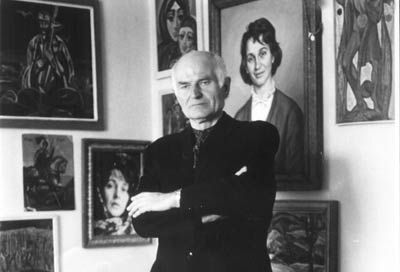
Meanwhile, on March 21, 1980, his son Volodymyr was expelled from the mechanics and mathematics faculty of KSU (because “it is not profitable for the Soviet state to teach an enemy”), and for refusing to join the army, he was also imprisoned for 3 years on January 9, 1981.
In 1981, a book about the Sichko family, “A Family Torn Apart,” prepared by Nina Strokata-Karavanska, was published in the USA by the Committee for the Defense of Persecuted Persons of the World Congress of Free Ukrainians.

On December 3, 1982, his son Vasyl Sichko was accused of the “manufacture and sale of narcotic substances,” and on January 4, 1983, he was sentenced to another 3 years in prison. On May 26, 1982, 40 days before the end of his term, Sichko was also charged with a new offense under Article 187-I of the Criminal Code of the Ukrainian SSR. On July 19, the criminal division of the Voroshylovhrad Regional Court sentenced him to 3 years of imprisonment in strict-regime camps. On October 31, Sichko was brought to Kherson, to camp YuZ-17/90, where the conditions were particularly harsh. He was released on May 26, 1985. He was placed under administrative supervision for 1 year. He was assigned to work at a sawmill at the reinforced concrete products plant in Dolyna.
On March 11, 1988, an “Appeal of the Ukrainian Helsinki Group to the Ukrainian and World Public on the Resumption of its Activities” was published, signed by 19 members of the UHG, including P. and V. Sichko. On April 26, the second anniversary of the Chornobyl disaster, members of the Ukrainian Christian-Democratic Front, led by Vasyl Sichko, raised the blue-and-yellow flag for the first time at a rally in Lviv. The official founding date of the UCDF is November 1, 1988.

The founding congress took place on January 13, 1989 (from April 1990, it became the Ukrainian Christian Democratic Party, UCDP). Vasyl was elected Chairman, and Sichko became a member of the Main Council and head of the Ivano-Frankivsk regional organization.
On April 4, 1989, Sichko spoke at an evening commemorating the 40th birthday of Volodymyr Ivasyuk at the Teacher's House in Kyiv. On the 10th anniversary of his death, the UCDP organized a memorial service at the Lychakiv Cemetery.
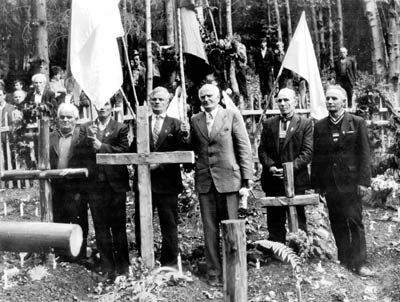
On June 4, the UCDF organized an environmental rally in Kalush, where both Sichkos spoke. For this, Sichko was arrested for 10 days on June 7. The Sichkos organized several similar rallies in Dolyna, for which they each received 15-day arrests. On September 18 and 29, Sichko was beaten by the police and suffered a concussion.
In 1994, 1998, and 2002, Sichko ran as a candidate for the Verkhovna Rada of Ukraine, but the votes were falsified. On September 9, 1996, his faithful partner and companion, Stefania Petrash, passed away. On November 17, 1997, his son Vasyl tragically died under unclear circumstances in the USA.
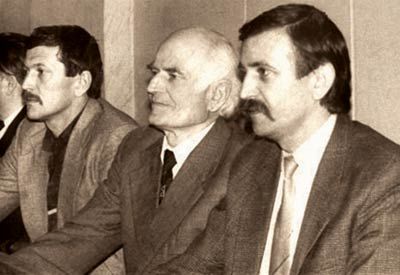
From December 22, 2002, Sichko served as acting Chairman of the UCDP, and at the 8th congress on March 8–9, 2003, he was elected its Chairman. However, the party was de-registered by the Ministry of Justice in 2003.
He lived in the town of Dolyna. In the summer of 2010, he went to visit his daughter Oksana in Riga (Latvia), where he died on July 5. He was buried on July 7 in Lviv at the Lychakiv Cemetery.
By a Presidential Decree of November 8, 2006, the members of the UHG, including Petro, Vasyl, and Stefania Petrash, were awarded the Order “For Courage,” 1st degree.
Bibliography (selected):
Sichko P. Appeal to the UN. // Shliakh Peremohy (USA), 1979. – September 16.
A Chronicle of Current Events. Amsterdam: Herzen Foundation, 1979, Issue 16, Issue 51— pp. 43, 167; 1980, Issue 53.— pp. 69, 72-75; Issue 54.— pp. 37, 149; Issue 55.— pp. 5-6; Issue 56.— pp. 69, 111; 1983, Issue 63. – p. 168.
Visnyk Represiy v Ukrayini [Herald of Repressions in Ukraine]. Foreign Representation of the UHG. Editor-compiler N. Svitlychna. New York. 1980–1985. – 1980: 1-4, 8-21, 8-22, 8-23, 10-20; 1981: 1, 2, 3, 5; 1982: 2-2, 6-12, 6-32, 7/8-4, 9-9, 10-22; 1984: 6-20; 1985: 5-16, 6-19, 10-17.
A Family Torn Apart. Comp. By Dr. Nina Strokata, Human Rights Commission, World Congress of Free Ukrainians, 1981.
Information Bulletins of the Ukrainian Helsinki Group. Issues 1978–1980. – Toronto–Baltimore: “Smoloskyp,” 1981. – pp. 110, 118─121, 141─149, 158.
The Ukrainian Helsinki Group. 1978–1982. Documents and Materials. Compiled by O. Zinkevych. Toronto—Baltimore: Smoloskyp, 1983. – pp. 633─705.
Alekseeva L. The History of Dissent in the USSR. The Modern Period. // Vest. Vilnius—Moscow (VIMO), 1992. – pp. 30-33.
The Russification of Ukraine. Published by UKKA, K., 1992. – pp. 374─375.
The Ukrainian Helsinki Group. On the 20th Anniversary of its Creation. Prepared by V. Kipiani, V. Ovsiyenko. — K.: URP, 1996.— pp. 23-24.
The Ukrainian Public Group to Promote the Implementation of the Helsinki Accords: Documents and Materials. In 4 volumes. KHPG. Comp. Y.Y. Zakharov, V.V. Ovsiyenko. Kharkiv: Folio, 2001. – Vol. 1, pp. 150─153; Vol. 3, p. 90; Vol. 4, pp. 10─12, 128─134, 138─139, 146─149.
The Three Uprisings of the Sichkos: In two volumes. Vol. 1. Memoirs of Stefania Petrash-Sichko. Documents / KHPG; Editor-compiler V.V. Ovsiyenko. Kharkiv: Folio, 2003. ─ 256 p.; Vol. 2: Memoirs. Interviews. Letters. – 240 p.
Museum-Archive of Ukrainian Samvydav of the “Smoloskyp” International Charitable Foundation.
Kharkiv Human Rights Protection Group Archive: P. Sichko's memoir “Stalin's THETAs” https://museum.khpg.org/1121774680; Interview with P. Sichko, July 7, 1998 https://museum.khpg.org/1121769743; February 4, 2000 https://museum.khpg.org/1121771097 and with Volodymyr Sichko, December 17, 2002 https://museum.khpg.org/1121768715.
Archive of Nina Strokata-Karavanska at the Sixtiers Museum in Kyiv.
Volodymyr Kaplun, Vasyl Ovsiyenko. Petro Sichko has Passed Away // Prava Lyudyny, No. 19 (563). – 2010. – July 1-15. – pp. 11-12.
International Biographical Dictionary of Dissidents in Central and Eastern Europe and the Former Soviet Union. Vol. 1. Ukraine. Part 2. – Kharkiv: Kharkiv Human Rights Protection Group; “Prava Lyudyny,” 2006. – pp. 712–717. https://museum.khpg.org/1113938027
The Resistance Movement in Ukraine: 1960–1990. An Encyclopedic Guide / Foreword by Osyp Zinkevych, Oles Obertas. – K.: Smoloskyp, 2010. – pp. 505–596; 2nd ed.: 2012, – pp. 676–678.
Volodymyr Kaplun, Vasyl Ovsiyenko. Kharkiv Human Rights Protection Group. March 6–7, 2004. Last read on July 23, 2016.
Bibliography (more complete):
The Ukrainian Human Rights Movement. Documents and Materials of the Ukrainian Public Group to Promote the Implementation of the Helsinki Accords. Compiled by O. Zinkevych. V. Symonenko “Smoloskyp” Ukrainian Publishing House. Toronto – Baltimore. 1978. p. X.
KGB Persecutes Former Political Prisoners. // Newspaper “Svoboda” (USA), No. 270, December 12, 1978.
Petro Sichko's Appeal to the UN. // Newspaper “Shliakh Peremohy” (USA), September 16, 1979.
Chekists to Try Father and Son Sichko. // Newspaper “Homin Ukrayiny” (USA), September 19, 1979.
A Chronicle of Current Events. Amsterdam: Herzen Foundation, 1979, Issue 16.
A Chronicle of Current Events. New York: Khronika, 1979, Issue 51— pp. 43, 167.
Petro Sichko's Appeal to the UN. Magazine “Shliakh Peremohy” (USA), September 16, 1979.
“The Spirit of Ukraine Lives On...” // Newspaper “Narodna Volia” (USA), No. 45, November 29, 1979.
Father and Son Sichko - Arrested. // Newspaper “Novyi Shliakh” (USA), No. 48, December 1, 1979.
Petro and Vasyl Sichko Sentenced to Three Years of Imprisonment. // Newspaper “Svoboda” (USA), No. 14, January 18, 1980.
Sichkos get three years each. // Ukrainian Weekly (USA), No. 16, January 20, 1980.
Protest by Stefania Petrash-Sichko to the Presidium of the Supreme Soviet of the USSR. Magazine “Svoboda” (USA), February 28, 1980.
A Web of Intrigue and KGB Provocations Surrounding the Sichko Case. // Newspaper “Svoboda” (USA), No. 47, February 28, 1982.
Petro and Vasyl Sichko Convicted for Honoring the Memory of Volodymyr Ivasyuk. They Tried to Pin Schizophrenia on Vasyl Sichko. // Newspaper “Svoboda” (USA), February 27, 1980.
Petro and Vasyl Sichko Convicted for Honoring the Memory of Volodymyr Ivasyuk. // Newspaper “Ameryka” (USA), No. 34, February 29, 1980.
The Arrest of Petro and Vasyl Sichko. // Newspaper “Novyi Amerikanets.” June 23-28, 1980.
Visnyk Represiy v Ukrayini. Foreign Representation of the Ukrainian Helsinki Group. Issue 1-3, 1980. 1-4. The Conviction of Helsinki Group Members Vasyl and Petro Sichko.
The Persecution of the Ukrainian Helsinki Group. Human Rights Commission, World Congress of Free Ukrainians. Toronto, Canada. 1980. pp. 51-52 (Biographical information on V. and P. Sichko).
Appeal by Stefania Petrash to the UN Assembly... // Information Bulletin No. 2, March 1980. Compiled by Nadia Svitlychna. Foreign Representation of the Ukrainian Helsinki Group. New York, 1981. pp. 18─21.
Visnyk Represiy v Ukrayini. 1980, Issue 8. 8-21, 8-22. (On the conditions of P. and V. Sichko in the camps).
CCE. New York: Khronika, 1980, Issue 53.— pp. 69, 72-75; Issue 54.— pp. 37, 149; Issue 55.— pp. 5-6; Issue 56.— pp. 69, 111.
A Family Torn Apart. Comp. By Dr. Nina Strokata, Human Rights Commission, World Congress of Free Ukrainians, 1981.
Information Bulletins of the Ukrainian Public Group to Promote the Implementation of the Helsinki Accords. Helsinki Guarantees for Ukraine Committee. Comp. O. Zinkevych. V. Symonenko “Smoloskyp” Ukrainian Publishing House. Toronto — Baltimore, 1981. pp. 110, 118─121, 141─149, 158.
Ukrainian Political Prisoners in the USSR. Address Directory. As of December 1981. Compiled by Marta Harasovska. “Smoloskyp” V. Symonenko Ukrainian Publishing House. Toronto - Baltimore, 1981. pp. 129-130.
Sichko, Striltsiv receive new labor-camp sentences. // Svoboda, No. 10. March 7, 1982.
A Web of Intrigue and KGB Provocations Surrounding the Sichko Case. // Ukrayinska Dumka. June 3, 1982.
Visnyk Represiy v Ukrayini. 1982, Issue 6, 6-12, 6-32 (On the new case of Petro Sichko, photo of the family with O. Meshko); Issue 7/8-4; Issue 9, 9-9 (On the new arrest of P. Sichko); Issue 10, 10-22 (On Vasyl Sichko).
Repressions Against the Sichkos Continue in the Camps. // Newspaper “Svoboda” (USA). July 28, 1982.
CCE.— New York: Khronika, 1983, Issue 63.— p. 168.
An Appeal by Stefania Petrash-Sichko in Defense of Her Imprisoned Husband. // Smoloskyp No. 20-21, March 10, 1983.
Desperate Appeal by Stefania Petrash-Sichko in Defense of Her Imprisoned Sons and Husband. March 10, 1983. // Newspaper “Ameryka” (USA, Philadelphia), June 9, 1983.
Stefania Petrash-Sichko's Appeal in Defense of Her Two Imprisoned Sons and Husband. March 10, 1983. // Newspaper “Svoboda” (USA), No. 111, June 15, 1983.
The Sichko Family Drama. // Newspaper “Shliakh Peremohy,” No. 27 (1525), July 3, 1983.
Visnyk Represiy v Ukrayini. Foreign Representation of the Ukrainian Helsinki Group.— New York, 1982, 6-12, 6-32, 7/8-4; 1984, 6-20.
The Ukrainian Helsinki Group. 1978 — 1982. Documents and Materials. Compiled and edited by Osyp Zinkevych. V. Symonenko “Smoloskyp” Ukrainian Publishing House. Toronto — Baltimore. 1983. pp. 633─705.
Visnyk Represiy v Ukrayini. Foreign Representation of the Ukrainian Helsinki Group.— New York, 1984, 6-20.
Sons Follow in their Father's Footsteps. // Newspaper “Svoboda” (USA), No. 27, February 1985.
P. Ruban and P. Sichko Re-imprisoned. // Newspaper “Shliakh Peremohy” (USA), August 18, 1985.
Visnyk Represiy v Ukrayini. 1985, Issue 5, 5-16 (On the end of Petro Sichko's term); Issue 7/8, 7/8-22 (On the end of Vasyl Sichko's term); Issue 10, 10-17 (On the Sichko family).
Alekseeva Lyudmila. The History of Dissent in the USSR. The Modern Period. // Vest. Vilnius ─ Moscow (VIMO), 1992, pp. 30-33.
The Russification of Ukraine. A popular science collection. Publication of the Ukrainian Congress Committee of America, Council for the Defense and Aid to Ukraine. K., 1992. pp. 374─375 (On the Sichko cases).
Kasianov, H. The Dissenters: The Ukrainian Intelligentsia in the Resistance Movement of the 1960s-1980s.— K.: Lybid, 1995.— pp. 166, 169, 173-175.
The Ukrainian Helsinki Group. On the 20th Anniversary of its Creation. Prepared by V. Kipiani, V. Ovsiyenko. — K.: URP, 1996.— pp. 23-24.
Rusnachenko, A. The National Liberation Movement in Ukraine.— K.: O. Teliha Publishing House.— 1998.— p. 212.
The Ukrainian Public Group to Promote the Implementation of the Helsinki Accords: Documents and Materials. In 4 volumes. Kharkiv Human Rights Protection Group. Compilers Y.Y. Zakharov, V.V. Ovsiyenko. Kharkiv: Folio, 2001. Vol. 1, pp. 150─153; Vol. 3, p. 90; Vol. 4, pp. 10─12, 128─134, 138─139, 146─149.
The Three Uprisings of the Sichkos. Compiled by V. Ovsiyenko. KHPG Publishing, 2004.
Petro Sichko's Archive (letters, documents, manuscripts, photographs).
Museum-Archive of Ukrainian Samvydav of the “Smoloskyp” International Charitable Foundation.
Archive of Nina Strokata-Karavanska at the Sixtiers Museum in Kyiv.
Kharkiv Human Rights Protection Group Archive, including audio recordings of interviews with Petro Sichko on July 7, 1998, and February 4, 2000.
Compiled by V. Ovsiyenko, March 6–7, 2004. Kharkiv Human Rights Protection Group.
